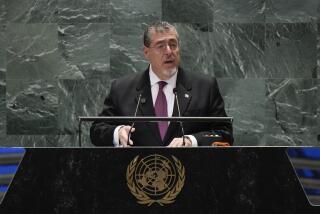Mideast peace talks back on track
With help from an Egyptian cease-fire proposal for the Gaza Strip, Secretary of State Condoleezza Rice persuaded the U.S.-backed Palestinian leadership Wednesday to resume peace talks with Israel.
Palestinian Authority President Mahmoud Abbas had halted the negotiations Sunday over an Israeli incursion into Gaza and had rebuffed Rice’s entreaties Tuesday to change his mind. But after speaking to Abbas by telephone Wednesday, Rice announced here that the peace talks were back on track.
Abbas later confirmed the reversal in a statement from his West Bank headquarters. He said his moderate Palestinian faction remained committed to the “strategic choice” of negotiations as a means for achieving an independent state alongside Israel.
“We have the intention of resuming the peace process,” he said, without giving a date for the next round of talks.
President Bush, who helped launch the peace talks at a November conference in Annapolis, Md., is pushing for agreement by the end of his term on the main issues of a final settlement: borders, the status of Palestinian refugees and conflicting claims to Jerusalem.
But the effort is threatened by violence in Gaza, where the ruling Hamas faction calls for Israel’s destruction and opposes the talks.
Israel said its five-day assault on Gaza, which ended early Monday, was aimed at stopping a growing barrage of rocket fire at its border communities. Palestinian outrage over the death toll in Gaza, which exceeded 100 and included many civilians, prompted Abbas to suspend the talks.
Rice had planned her two-day visit to Egypt, the West Bank and Israel before the incursion, hoping to advance the talks. Instead she struggled to rescue them from collapse.
“Hamas, which in effect holds the people of Gaza hostage in their hands, is now trying to make the path to a Palestinian state hostage to them,” Rice said during a news conference in Jerusalem with Israeli Foreign Minister Tzipi Livni. “And we cannot permit that to happen.”
Abbas’ spokesman, Nabil abu Rudaineh, said two assurances from Rice swayed the Palestinian leader to drop his condition that a truce take hold in Gaza before talks resumed.
Rice said she was sending David Welch, assistant secretary of State for Near Eastern affairs, back to Cairo for discussions about Gaza, the topic of her talks with Egyptian officials Tuesday.
And she promised to dispatch Lt. Gen. William Fraser III to the region next week to assess progress on incremental steps agreed to in Annapolis. Abbas’ aides said they hoped Fraser would pressure Israel to halt Jewish settlement activity and to ease travel restrictions for Palestinians in the West Bank.
Palestinian officials took Welch’s return to Cairo as a sign of U.S. support for Egyptian efforts to bring calm to Gaza.
A cease-fire is part of a proposed Egyptian package that would also include the reopening of the border between Gaza and Egypt, the release of an Israeli soldier seized by Gaza militants in 2006, and tighter security to prevent Hamas from smuggling weapons from Egypt through tunnels under the border.
Israel Radio said Rice briefed Prime Minister Ehud Olmert and other Israeli officials on the Egyptian proposal.
But she was vague about it at the news conference and avoided the term “cease-fire,” apparently because it might imply support for indirect negotiations with Hamas, which the Bush administration considers a terrorist organization and has worked to isolate.
“We’re not trying to broker something here,” Rice said, noting that Israel has its own contacts with Egypt. “It’s just a matter of all parties discussing” Gaza.
Egyptian Foreign Minister Ahmed Aboul Gheit, in a news conference with Rice on Tuesday, suggested that the effort to isolate Hamas could not continue.
“We have to admit that Hamas is part of the Palestinian equation and should be dealt with,” he said. “If Hamas corrects its path, stops using violence and puts an end to military operations, this will open the door for it to join the [peace] process.”
Abdel Monem Said, director of the Al Ahram Center for Political and Strategic Studies in Cairo, said Egyptian security officials had held four meetings recently with Hamas leaders trying to broker a truce with Israel.
“There are huge pressures on Hamas now,” he said, noting that supplies of electricity, fuel and food were dwindling because of an Israeli blockade of Gaza.
By stepping up its own electricity supplies and humanitarian aid, Egypt is “trying to entice Hamas to stop firing rockets,” he said.
Olmert left open the possibility of an unofficial truce with Hamas, telling reporters, “If there is no rocket fire at Israel, there won’t be Israeli attacks on Gaza.”
But a statement issued by Olmert’s office said Israel would act “continuously and systematically” to stop the rockets and weaken Hamas, even as peace talks with the moderate Palestinians resume.
Livni, the Israeli foreign minister, challenged Abbas to stick with the talks and let Israel deal with Hamas as it sees fit.
“Peace negotiation, it’s not a gift that somebody gives the other,” she said. “It’s a mutual interest. It’s a mutual aspiration and it’s a mutual agreement for our two peoples.”
--
Special correspondent Maher Abukhater in Ramallah, West Bank, and Noha El-Hennawy of The Times’ Cairo Bureau contributed to this report.
More to Read
Sign up for Essential California
The most important California stories and recommendations in your inbox every morning.
You may occasionally receive promotional content from the Los Angeles Times.










